Speaking & Listening Are Core Skills Today
Updated 2/3/24
By Erik Palmer

The primary responsibility of English and/or language arts teachers is to teach _____________ and _____________.
Did you think “reading” and “writing?” The overwhelming majority of educators do. Those two words are inextricably linked in our minds.
Look at session descriptions at educational conferences. Many are about “reading and writing” strategies. Look at educational materials being sold. Most want to help you with “reading and writing.” Follow Twitter chats online. Often the tweets are about cool things to use to teach “reading and writing.” We might as well just make one new word: readinganwriting.
Here is the second question of the quiz:
Adults spend a large amount of their waking hours communicating. Reading and writing make up _________percent of that time.
If you answered twenty-five percent, you are correct. Yes, only one-fourth of our communication time. That might seem surprising to teachers so focused on readinganwriting, but few people find the percentage hard to believe once they think about their typical day.
Sure, we spend some time with emails, online news, and print, but we spend way more time engaged in conversation. Three times more, in fact. Listening and speaking make up the other seventy-five percent of adult communication time.
We haven’t taken speaking & listening skills seriously
I came into education after a career in business. I ran a commodity brokerage firm, and I had a seat on the floor of a commodity exchange. Those are verbal businesses so I was perhaps more tuned in to oral communication than most teachers.
I noticed right away that my fifth and sixth graders spoke poorly. My teammates had an attitude of “Oh well, that’s just how kids speak.” How they do speak, however, is vastly different from how they can speak. And we would never say, “That’s just how kids do math.” Or read, or create a pot in art class. All these are skills that require teacher time and student practice.
I suggested to my teammates that after years of weekly share time, book reports, sharing solutions at the board, poetry recitations, and all the other talking students do in elementary school, to have students speak so poorly reflected badly on us as teachers. Clearly, we had been inattentive to the most important language art. Students had been shortchanged. Our expectations of them were way too low.
I asked for the materials we had for teaching speaking. We had a spelling program, a grammar program, a science program, a math program, a Daily Oral Language program, a drug education program, novel sets, and basal readers. We had zero materials about how to teach speaking. (Did I mention that speaking is not just for English class anymore?)
I started searching for resources to teach students how to be better oral communicators, and I discovered that there weren’t any. For example, the catalog of the National Council of Teachers of English had over 200 books listed yet included no books about how to teach speaking. (That’s still true today.) I was shocked and disappointed.
The solution? Create my own materials. I came up with a logical, practical framework for teaching speaking. I developed mini-lessons to teach the skills set out in the framework. I invented rubrics for evaluating speaking. You can get a sense of the framework and sample a couple of activities in this video:
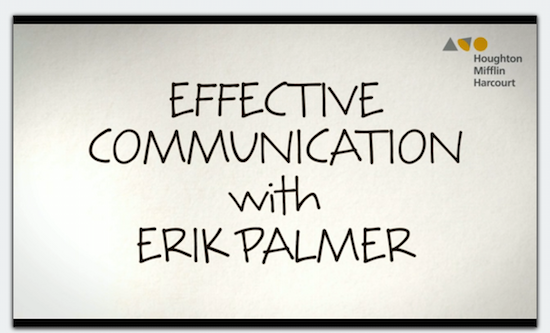
The result? My students began to speak well. An administrator in the building asked me to go to the school her sons attended to show that staff how to teach speaking. She wanted her children to be well spoken and gave me my first consulting job. I was invited to teach a workshop for a district’s summer teacher training.
Someone there suggested that I write a book. Stenhouse Publishers had the foresight to publish it: Well Spoken: Teaching Speaking to All Students. A second book, Digitally Speaking, followed. ASCD invited me to write Teaching the Core Skills of Listening & Speaking. Houghton Mifflin Harcourt asked me to be a program consultant for them.
I seem to have struck a chord
First, I think I created awareness. When teachers really look closely at students speaking—whether one-on-one, in a small group, or in a class presentation—they are quick to recognize that the students need help. We have been focused on other things (readinganwriting!) and we tolerated mediocre to poor oral communication.
Second, I think I filled a gap in teacher preparation. Teacher preparation programs and district workshops never show educators how to teach speaking. When speaking standards started showing up, teachers were not prepared to teach them. I ask teachers at workshops to tell me exactly what it takes to be a great speaker, and most are not sure.
Finally, I think I emphasized a skill coming back into fashion. Many digital communication tools exist—for podcasting, video creation, audio recording, producing webinars, and allowing face-to-face online communication. All of those tools showcase speaking, and many of us are beginning to realize the need to raise the bar for oral communication skills.
Simply put, we have shortchanged the most important language arts. That has to change. Our students can do better, and they deserve better. They obviously aren’t successful oral communicators now, and that won’t change unless we specifically teach them how to be well spoken. I’d suggest we start now.
(Editor’s note: Thanks to Dave Stuart Jr. for his post tracking down a direct link to Erik’s excellent animated video, which makes a compelling argument for speaking & listening instruction. Stuart’s “sparknotes” are a good read. Illustrations used in this post are from “Effective Communication with Erik Palmer.”)
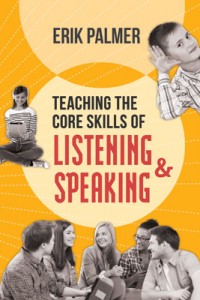

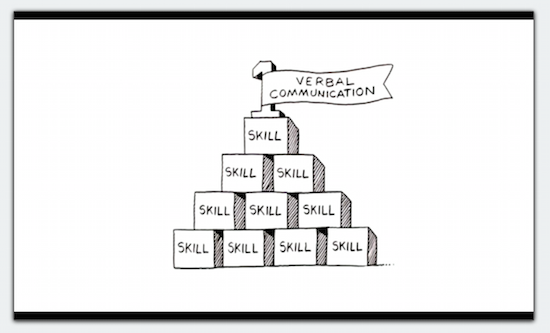


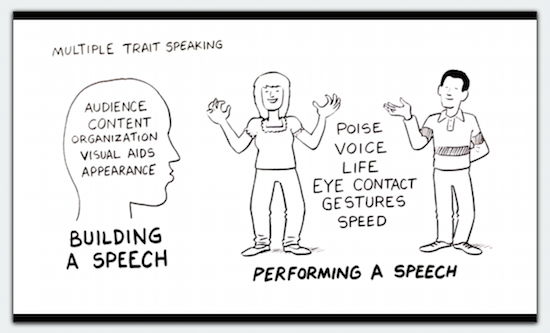
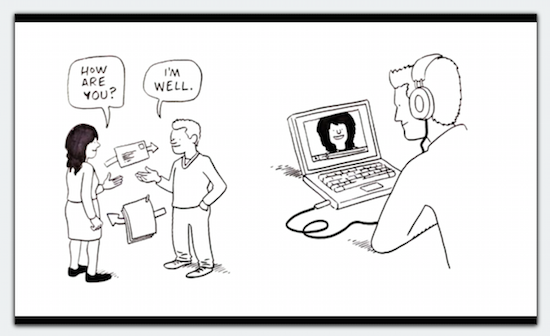



































I’m glad to see more focus on speaking and listening. Definitely agree that it has been largely ignored in middle schools. Interesting thing is that aside from it’s own value, it also does also impact reading and writing skills. There’s some interesting research on struggling readers and related listening comprehension problems. http://listencurrent.com/research
It was great to read this article. I’ve shared the cartoon with my colleagues as a reminder of why we chose to use pvlegs. I’m still going strong with it with my 7th grade classes.
Your cohort in Indiana.
Here’s a simple strategy used by Erik Palmer and recommended by Kelly Gallagher:
I teach sixth grade humanities at a private, progressive school. I employ public speaking in my class almost daily, either with students making oral presentations (either group or individual) based upon written essays or through class discussions. After our oral presentations, we utilized rubrics to provide constructive criticism to our speakers, based upon content of their presentations, as well as their presentation skills. The kids love giving feedback (especially commenting on filler words!) and at the same time, are becoming more comfortable and more skilled at public speaking.
I never thought about that: Being able to SPEAK a foreign language may also require that you first learn to speak your native (English) language well.
I’m Interested in critical listening skills.
I need new studies about them.
Can you help me please to get them or guide me to the websites where I can find information about them?